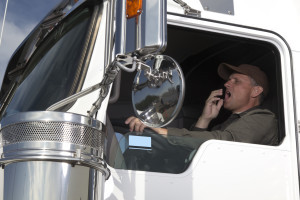Driver Fatigue Causes Nearly 4,000 Truck Crash Deaths Each Year
According to the U.S. Department of Transportation (“DOT”), tired truck drivers kill nearly 4,000 people each and every year in this country.
In an effort to reduce this disturbing statistic, the Federal Motor Carrier Safety Administration (“FMCSA”), tasked with governing the maximum number of hours a truck driver can drive before having to take a rest break, has made significant changes to the “hours of service” rules governing commercial drivers.
Unfortunately, some truck drivers still knowingly choose tobreak the law–and endanger the lives of American drivers–by driving while fatigued.
Why Do Truck Drivers Drive While Fatigued?
 There are a variety of reasons why truck drivers drive while fatigued.
There are a variety of reasons why truck drivers drive while fatigued.
Most often, truck drivers are forced to drive more hours than they should in order to meet tight deadlines set by their companies.
Other driversdrive tiredsimply to make more money for themselves in a shorter amount of time.
Regardless of why they do it, truck drivers that drive while fatigued are consciously choosing toput innocent lives in jeopardy.
What Makes Driving While Fatigued So Dangerous?
Most truck drivers, not to mention people in general, are unable to accurately assess their own level of fatigue and properly determine whether or not it is safe to continue driving.
In fact, according to the FMCSA, many fatigued drivers do not even notice when they begin to drift back and forth between lanes.
That means a tired truck driver can easily overestimate his ability to drive furtherwhile fatigued and end up causing a serious accident as a result.
Some studies have even shown driving while fatigued to be as bad as driving drunk.
What is the FMCSA Doing to Keep Fatigued Truck Drivers Off the Road?
Upon discovering that a disturbing number of truck drivers were running at or above the maximum number of driving hours allowed by law, in combination with new scientific studies documenting the link between long work hours without sufficient recovery time, loss of sleep and chronic fatigue, the FMCSAfinally decided to implement changes to the “hours of service” rules in effect nationwide.
Under the new rules, truck drivers are now required to take a half-hour rest break within the first 8 hours of their shift in order to promote alertness.
In addition, the FMCSA limited the use of the “restart”, a rest period of 34 hours, to only once every 7 days and mandated that each restart must include at least 2 periods of rest between 1:00 a.m. and 5:00 a.m. in order to promote sleep.
The net effect of the changes, according to the agency, was to limit the maximum a truck driver could drive each week to 70 hours, down from 82.
Trucking Companies Continue to Resist Tighter Restrictions on Driving Time
In mandating its changes to the “hours of service” rule, the FMCSA “fulfilled its responsibility to develop a rule based on the best science available, protect the driving public, and ensure the continued flow of commerce.”
However, this did not stop the trucking industry, along with other opponentsof the new regulations, from challenging them in court as overly restrictive.
While the court found that the new rules were indeed appropriate given the facts and data, on December 16, 2014, the FMCSA was forced to suspend enforcement of its “hours of service” rule changes due to the passage by Congress of a rider attached to the Consolidated and Further Continuing Appropriations Act that was attached to the final Appropriations bill for the year.
As a result, those that were operating an average of as many as 82 hours per week prior to the rule change are free to resume doing so until the suspension period is over.
That means truck drivers will be able to drive more hours on less rest, regardless of the fact that the scientific evidence makes it clear this could lead to an increase in fatigue-related accidents, injuries and deaths.
How Zehl & Associates is Helping People Fight Back Against the Trucking Industry
The truck accident lawyers at Zehl& Associates understand that the most effective way to get the attention of the trucking industry is by making companies pay—literally–for the damages and injuries their drivers cause.
How do we do that?
By filing a lawsuit in civil court and forcing the company, usually after months of investigation, hard work and litigation, to finally take responsibility for its actions by compensating those who have been wronged with money damages.
While it is impossible to erase what has happened, our civil justice system—the best the world has to offer, but far from perfect–allows monetary compensation in an effort to fix what can be fixed and to try to make up for what can’t be, to the greatest degree possible.
